| Clutching My Pearls is an ongoing blog series about my take on Jane Austen’s beliefs and ideas, as based on her novels. Click here for the first in the series. |
When we look back to Austen’s time, we see patriarchy embodied in both law and custom. It's routine for modern commentators to emphasize the subordinate legal and social position of women 200 years ago. It's routine for the heroine of a historical romance novel to shake her unruly curls and declare, "I will not be auctioned off like some prize heifer!" while her emerald-green eyes blaze with defiance.
But when we look at what Englishmen and women of Austen’s class said about themselves at the time, when we look at how they compared themselves to other countries and cultures, it is clear that people of her era firmly believed that English gentlewomen were the most privileged women on earth...
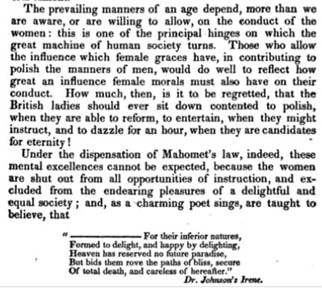 Hannah More, in "Essays on Various Subjects"
Hannah More, in "Essays on Various Subjects" In Africa, women drudged and toiled, doing all the manual labour for the tribe, while the warriors lounged around between battles. Indian widows were burned alive on their husband’s funeral pyres. In the Catholic countries, women were oppressed both by the church and their families.
Mary Wollstonecraft may have been a fierce critic of her own society, but she thought Islamic countries were worse, because she (and others) believed Islam denied that women even had souls.
It was routine to compare a domineering and unkind British husband to a "Turk" because it was taken for granted that Turkish women didn't have the freedoms of British women.
The popular writer and moralist Hannah More described Englishwomen as emancipated women.
“In this land of civil and religious liberty,” More wrote, “where there is as little despotism exercised over the minds, as over the persons of women, they have every liberty of choice and every opportunity of improvement…”
This confident opinion in the superiority of life for women in England was expressed in books and plays.
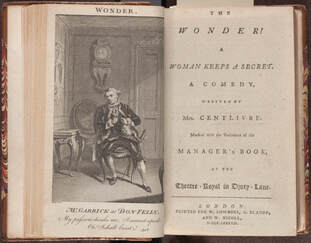
In The History of Melinda Harley (1778), Amanda and Melinda discuss the Indian custom of suttee, and Amanda exclaims: "what reason have we to be thankful, my dear Melinda, for having our lot cast in such an enlightened age, and in a country so justly renowned for arts and sciences, but above all for civil and religious liberty. May kind heaven long preserve those invaluable blessings to us…”
This doesn’t mean that the English believed men and women equal in the sense of being the same. The title of Centlivre’s play is a joke on the idea that women can’t keep a secret—so when one does, it’s a “wonder.” People in Austen’s time believed men and women were different in abilities and preferences, and not simply because society had made them so. Of course they acknowledged that society, education and upbringing had a huge influence. Education for females was a major topic of debate at the time, and it’s a consistent theme in Austen’s novels. But they also believed that certain attributes naturally belonged to men and others belonged to women. Opinions around this are much more confused and confusing today.
Jane Austen’s family used to engage in amateur theatricals when she was a child. The Wonder, or a Woman Keeps a Secret, was performed at her home in Steventon. Austen’s brother James wrote an epilogue for the play, which was performed by the leading lady; their pretty, witty, cousin Eliza de Feuillide, who is thought by many to be an inspiration for Mary Crawford in Mansfield Park.
| In Barbarous times, e’er learning’s sacred light Rose to disperse the shades of Gothic night And bade fair science wide her beams display, Creation’s fairest part neglected lay.... ...Such was poor woman’s lot – whilst tyrant men At once possessors of the sword and pen All female claim with stern pedantic pride To prudence, truth and secrecy denied, Covered their tyranny with specious words And called themselves creation’s mighty lords – But thank our happier Stars, those times are o’er; And woman holds a second place no more. Now forced to quit their long held usurpation, Men all wise, these ‘Lords of the Creation’! To our superior sway themselves submit, Slaves to our charms, and vassals to our wit; We can with ease their ev’ry sense beguile, And melt their Resolutions with a smile. |
James' message is that Mankind has arisen, through the aid of Science, from a past barbarous age. In the distant past, when men were savage warriors, they could not even appreciate the virtues or talents of women. And women were long denied education because men possessed the sword and the pen. He finishes with a flourish of gallantry toward lovely womankind reminiscent of Mr. Elton's charade. Man's boasted power and freedom, all are flown/Lord of the earth and sea, he bends a slave, /And woman, lovely woman, reigns alone.
I haven’t made a survey of all eighteenth-century literature, so it’s presumptuous of me to connect the dots here, but James Austen's ideas exactly coincide with the explanation of social history given in Lord Kames’ influential book, Sketches of the History of Man (1774). Below is a sample. I imagine that some people today are reduced to a state of spluttering rage when they read Lord Kame but these were the views of educated people in Jane Austen's time. Lord Kame also criticized the restricted life led by women in Asia, and says their education gave them "no improvement of the rational faculties."
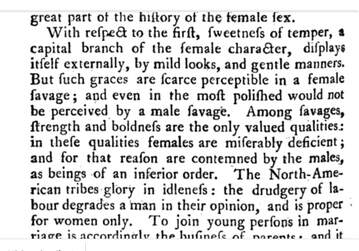 Lord Kame on the inferior position of women in aboriginal societies
Lord Kame on the inferior position of women in aboriginal societies However, this says more about Austen's opinion of most men than it does her opinion of women. Mr. Darcy, of course, says that an accomplished woman (though denied the opportunity to attend Cambridge or Oxford, of course) improves her mind with extensive reading.
Austen clearly believes that women are rational creatures, capable of thought, capable of receiving an education. Women are called upon to act morally, which means she believes that women have moral agency.
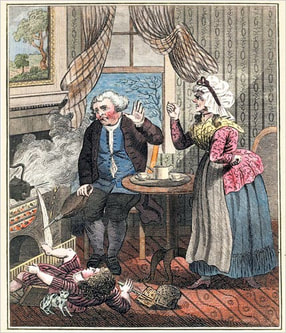 “The Comforts of Matrimony — A Smoky House and Scolding Wife,” 1790.
“The Comforts of Matrimony — A Smoky House and Scolding Wife,” 1790. "Rational" is a term of high praise in Austen. Mr. Knightley says Emma's governess, "a rational, unaffected woman," didn't need Emma's interference in her love life. After Robert Martin consults him about marrying Harriet Smith, he remarks to Emma, "as to a rational companion or useful helpmate, he could not do worse." When Harriet attempts to get over her crush on Mr. Elton, she asks Emma to witness "how rational [she had] grown."
Likewise, to be "irrational" is a strong term of disapproval. When Emma realizes how deluded she's been, she scolds herself, "How inconsiderate, how indelicate, how irrational, how unfeeling had been her conduct!"
In Pride & Prejudice, Elizabeth begs Mr. Collins to see her as a "rational creature" when she turns down his proposal. Mr. Bennet tells Kitty she can't go out until she's spent at least ten minutes a day in a rational manner.
Austen also describes her most likeable characters as "sensible." The late Lady Elliot and her friend Lady Russell are sensible, so of course is Charlotte Lucas. Marianne Dashwood is "sensible and clever."
With the exception of Catherine Morland --Henry Tilney loves the "excellencies of her character"-- Austen's heroines are sensible, rational creatures and the men who love them respect their intelligence.
There's more to be said about women's inferior position in England, and whether Jane Austen has secret messages in her novels concerning this issue but for now, we should understand that it is a distortion of history to suppose that all Englishwomen saw themselves as miserably oppressed, or that the men of her time really preferred imbeciles for wives. The reality is more nuanced.
Previous post: Better to be English Next post: Remembrance Day - Hail and Farewell
| In my book, A Marriage of Attachment, a woman is terrified that her husband will take her wages, which he is entitled to by law, but which she needs to support their children. For more about my novels, click here. Rational Creatures is the name of an anthology about Austen's secondary female characters. I contributed a short story about Mrs. Clay, who certainly is a woman who acts in her own self-interest. Click here for more about the Quill Ink anthologies. Update: During my series on education for women in the Regency, I revisited the question of whether men wanted to marry pretty little fools or intelligent companions. |

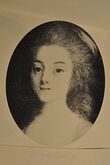
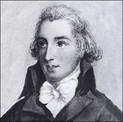
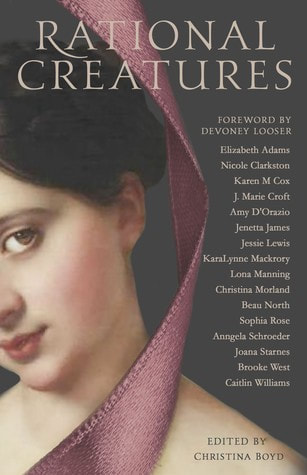
 RSS Feed
RSS Feed